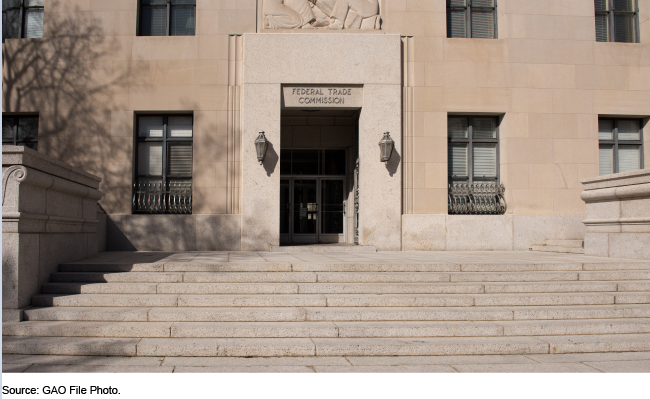Antitrust: DOJ and FTC Jurisdictions Overlap, but Conflicts are Infrequent
Fast Facts
The Department of Justice (DOJ) and the Federal Trade Commission (FTC) both enforce federal antitrust laws, which are meant to promote free and fair competition in the marketplace.
We reviewed the types of antitrust cases each agency investigates, areas of overlap, and instances of conflict with respect to antitrust enforcement.
We found that DOJ and FTC have an interagency clearance process to identify which agency will take on an antitrust case, and instances of conflict rarely occur. In addition, after an investigative agency is determined through the clearance process, the other agency rarely interferes or comments on that investigation.

Highlights
What GAO Found
The Department of Justice's (DOJ) Antitrust Division and the Federal Trade Commission (FTC) have broad statutorily-based jurisdiction with respect to antitrust cases. In addition, over time each agency developed expertise in a particular industry or market, though there can be overlap. For example, in fiscal year 2020, DOJ and FTC reviewed an equal number of transactions related to internet service providers, web service portals, and data processing services, as both agencies had the authority to do so. The two agencies have developed a process to determine which agency is to investigate each transaction, which they call “clearance”. This process establishes standards and criteria for determining which agency has the expertise for the transaction under review. However, agency officials clarified that while expertise in a particular industry or market is the primary factor considered for clearance, other factors—such as resource constraints, emerging industries, and new technologies, among others—may affect the final determination.
DOJ and FTC have an interagency clearance process for determining the investigative agency on antitrust cases, and instances of conflict occur infrequently. Specifically, the clearance process ensures that the agencies have a process to confer and, if necessary, escalate the clearance decision when both agencies wish to investigate the same transaction, known as contested clearance. If left unresolved, this process can ultimately result in clearance decisions being made by agency leadership—the Assistant Attorney General for the Antitrust Division and the Chair of the FTC. According to FTC data GAO analyzed, from fiscal years 2000-2020, the number of contested clearances never rose above 5.5 percent of transactions reported in any 1 year. Further, the number of contested clearances made up less than 1 percent of transactions reported to DOJ and FTC in 4 of the last 5 years GAO reviewed (fiscal years 2016-2020).
Conflict between DOJ and FTC after the clearance process is completed is rare. According to agency officials, after an investigative agency is determined through the clearance process, the other agency rarely interferes or comments on the other's investigations. Further, agency officials from DOJ and FTC noted that they have an amicable relationship and generally have the same interpretation of antitrust matters. GAO's analysis found that DOJ and FTC submitted 420 court filings in antitrust cases over the 20-year period (2000-2020). Out of the 420 filings, GAO found no instances of FTC directly commenting on a DOJ case and only six instances of DOJ commenting on a FTC case without being a party to the litigation. In four of the six cases where DOJ commented on a FTC case, DOJ expressed views in support of FTC's position. In the remaining two cases, DOJ expressed views in opposition to FTC's position. This represents less than 1 percent of the total number of briefs filed over the 20-year period. In one of these two cases, FTC sought review from the Supreme Court, however its petition was denied. In the other case, the appeals court overturned the district court's decision in favor of FTC's position.
Why GAO Did This Study
DOJ's Antitrust Division and the FTC each have responsibility for the enforcement of federal antitrust laws. The goal of antitrust laws is to protect economic freedom and opportunity by promoting free and fair competition in the marketplace. Competition in a free market benefits American consumers through lower prices, better quality and greater choice.
Questions have been raised about potential areas of conflict between DOJ and FTC with respect to antitrust enforcement actions. A House report accompanying the 2021 Consolidated Appropriations Act includes a provision for GAO to study DOJ and FTC antitrust actions.
This report describes (1) the jurisdictions of the DOJ and FTC with respect to antitrust cases, and the extent to which the jurisdictions overlap; (2) the process DOJ and FTC use to determine the investigative agency in a case, and how frequently conflicts arise; and (3) the extent to which antitrust cases have resulted in conflicts between DOJ and FTC after an investigative agency has been identified.
GAO reviewed statutes, relevant agency policies, and DOJ and FTC's annual competition reports for fiscal years 2000-2020, the most recent data available. GAO also analyzed data published in the annual reports and unpublished data from FTC's clearance database. Further, GAO reviewed DOJ and FTC filings in antitrust cases from 2000-2020. In addition, GAO interviewed DOJ and FTC officials about their jurisdictions, processes, and interactions with one another.
For more information, contact Gretta L. Goodwin at (202) 512-8777 or goodwing@gao.gov.
